
Will Germany Kill the Goose that Laid the Golden Egg?

Will Germany Kill the Goose that Laid the Golden Egg?
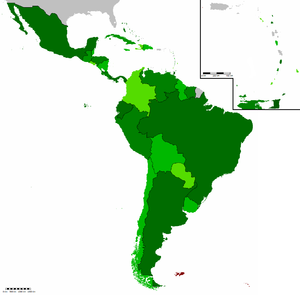
The Community of Latin American and Caribbean States (Spanish: Comunidad de Estados Latinoamericanos y Caribeños, CELAC, Portuguese: Comunidade de Estados Latino-Americanos e Caribenhos, French: Communauté des États Latino-Américains et Caribéens, Dutch: Gemeenschap van de Latijns-Amerikaanse en Caribische landen) is the tentative name[1] of a regional bloc of Latin American and Caribbean nations created on February 23, 2010, at the Rio Group–Caribbean Community Unity Summit held in Playa del Carmen, Quintana Roo, Mexico.[2][3] It consists of all sovereign countries in the Americas, except for Canada, France, the Netherlands and the United States. British and Danish dependencies in the Americas are also not represented in CELAC.
CELAC is an example of a decade-long push for deeper integration within the Americas.[4] CELAC is being created to deepen Latin American integration and to reduce the once overwhelming influence of the United States on the politics and economics of Latin America, and is seen as an alternative to the Organization of American States (OAS), the regional body organized largely by Washington in 1948, ostensibly as a countermeasure to potential Soviet influence in the region.[4][5] [6]
Continue reading “Mini-Me: Comunidad de Estados Latinoamericanos y Caribeños (CELAC)”

Gringos? We don't need no stinkin' gringos…
A Union is Born: Latin America in Revolution
The Community of Latin American and Caribbean States (CELAC)
by Eva Golinger
Global Research, December 8, 2011
While much of the world is in crisis and protests are erupting throughout Europe and the United States, Latin American and Caribbean nations are building consensus, advancing social justice and increasing positive cooperation in the region. Social, political and economic transformations have been taking place through democratic processes in countries such as Venezuela, Bolivia, Ecuador, Nicaragua, Uruguay, Argentina and Brazil throughout the past decade, leading to a massive reduction in poverty and income disparity in the region, and a substantial increase in social services, quality of life and direct participation in political process.
 One of the major initiatives of progressive Latin American governments this century has been the creation of new regional organizations that promote integration, cooperation and solidarity amongst neighboring nations. Cuba and Venezuela began this process in 2004 with the founding of the Bolivarian Alliance for the Peoples of Our America (ALBA), that now includes Bolivia, Ecuador, Nicaragua, Dominica, St. Vincent’s and the Grenadines and Antigua and Barbuda. ALBA was initially launched in response to the US government’s failed attempt to impose its Free Trade Agreement of the Americas (FTAA) throughout the region.
One of the major initiatives of progressive Latin American governments this century has been the creation of new regional organizations that promote integration, cooperation and solidarity amongst neighboring nations. Cuba and Venezuela began this process in 2004 with the founding of the Bolivarian Alliance for the Peoples of Our America (ALBA), that now includes Bolivia, Ecuador, Nicaragua, Dominica, St. Vincent’s and the Grenadines and Antigua and Barbuda. ALBA was initially launched in response to the US government’s failed attempt to impose its Free Trade Agreement of the Americas (FTAA) throughout the region.
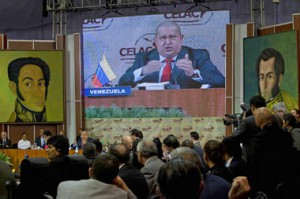
Today ALBA is a thriving multilateral organization with member nations that share similar political visions for their countries and for the region, and includes numerous cooperation agreements in economic, social and cultural areas. The fundamental basis of trade amongst ALBA nations is solidarity and mutual benefit. There is no competition, exploitation or attempt to dominate amongst ALBA states. ALBA even counts on its own currency, the SUCRE, which allows for trade between member nations without dependence on the US dollar.
In 2008, the Union of South American Nations (UNASUR) was formally established as a regional body representing South American states. While ALBA is much more consolidated as a unified political voice, UNASUR represents a diversity of political positions, economic models and visions for the region. But UNASUR members share the common goal of working towards regional unity and guaranteeing the resolution of conflicts through peaceful and diplomatic means. UNASUR has already played a key role in peacefully resolving disputes in Bolivia, particularly during an attempted coup against the government of Evo Morales in 2008, and has also successfully moderated a severe conflict between Colombia and Venezuela, leading to the reestablishment of relations in 2010.
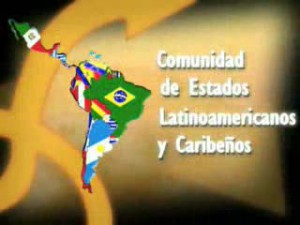 Two hundred years ago, South American Independence hero Simon Bolivar, a native of Venezuela, dreamed of building regional unity and creating a “Patria Grande” (Grand Homeland) in Latin America. After achieving independence for Venezuela, Bolivia, Ecuador and Colombia, and fighting colonialists in several Caribbean nations, Bolivar attempted to turn this dream of Latin American unity into reality. His efforts were sabotaged by powerful interests opposing the creation of a solid regional bloc, and eventually, with the aid of the United States, Bolivar was ousted from his rule in Venezuela and died isolated in Colombia several years later. Meanwhile, the US government had proceeded to implement its Monroe Doctrine, a decree first declared by President James Monroe in 1823 to ensure US domination and control over the newly-freed nations in Latin America and the Caribbean.
Two hundred years ago, South American Independence hero Simon Bolivar, a native of Venezuela, dreamed of building regional unity and creating a “Patria Grande” (Grand Homeland) in Latin America. After achieving independence for Venezuela, Bolivia, Ecuador and Colombia, and fighting colonialists in several Caribbean nations, Bolivar attempted to turn this dream of Latin American unity into reality. His efforts were sabotaged by powerful interests opposing the creation of a solid regional bloc, and eventually, with the aid of the United States, Bolivar was ousted from his rule in Venezuela and died isolated in Colombia several years later. Meanwhile, the US government had proceeded to implement its Monroe Doctrine, a decree first declared by President James Monroe in 1823 to ensure US domination and control over the newly-freed nations in Latin America and the Caribbean.
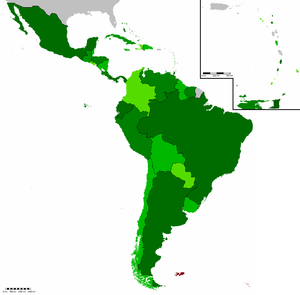 Nearly two hundred years of invasions, interventions, aggressions, coup d’etats and hostilities led by the US government against Latin American nations shadowed the 19th and 20th centuries. By the end of the 20th century, Washington had successfully imposed governments in every Latin American and Caribbean nation that were subordinate to its agenda, with the exception of Cuba. The Monroe Doctrine had been achieved, and the US felt confident in its control over its “backyard”.
Nearly two hundred years of invasions, interventions, aggressions, coup d’etats and hostilities led by the US government against Latin American nations shadowed the 19th and 20th centuries. By the end of the 20th century, Washington had successfully imposed governments in every Latin American and Caribbean nation that were subordinate to its agenda, with the exception of Cuba. The Monroe Doctrine had been achieved, and the US felt confident in its control over its “backyard”.
The unexpected turn at the beginning of the 21st century in Venezuela, formerly one of Washington’s most stable and subservient partners, came as a shock to the US. Hugo Chavez had been elected President and a Revolution had begun. A coup d’etat attempt in 2002 failed to subvert the advancement of the Bolivarian Revolution and the spread of revolutionary fever throughout the region. Soon Bolivia followed, then Nicaragua and Ecuador. Argentina, Brazil and Uruguay elected socialist presidents, two of them former guerrilla fighters. Major changes began to occur throughout the region as the peoples of this vast, diverse and rich continent assumed power and made their voices heard.
Social transformations in Venezuela that gave voice to people’s power became exemplary for others in the region, as did President Chavez’s defiance of US imperialism. A powerful sentiment of Latin American sovereignty and independence grew stronger, even reaching those with governments aligned with US interests and multinational control.
On December 2-3, 2011, the Community of Latin American and Caribbean States (CELAC) was born and the overwhelming force of a continent nearly 600 million strong, achieved a 200-year dream of unity. The 33 member nations of CELAC all agree on the unquestionable necessity to build a regional organization that represents their interests, and that excludes the overbearing presence of the US and Canada. While CELAC will take time to consolidate, the exceptional commitment evidenced by the 33 states present at its launching in Caracas, Venezuela, cannot be underestimated.
CELAC will have to overcome attempts to sabotage and neutralize its expansion and endurance, and the threats against it and intents to divide member nations will be numerous and frequent. But the resistance of the peoples of Latin America and the Caribbean who have resumed this path of unity and independence after nearly two hundred years of imperialist aggression, demonstrates the powerful force that has led this region to become an inspiration for those seeking social justice and true freedom around the world.
Phi Beta Iota: Emphasis added. This is largely a Cuban G-2 puff-piece, but it also represents real potential. A great deal will depend on whether Cuba and Venezuela get serious about creating the M4IS2 capabilities needed to harmonize internal spending while shutting out predatory external influences. We would not be surprised to find CIA Stations shut down across Central and South America in the next few years, as these governments stop tolerating incompetent but active spy units operating from official installations.
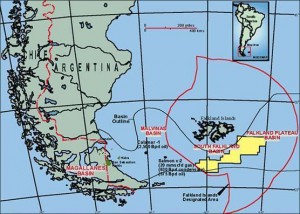
See Also:
CELAC Fulfills Dreams of Bolivar, Marti, Morazan
New non-U.S. Latin America group points to Washington's waning influence
CELAC: Speaking for Latin America and the Caribbean
Latin America’s Pacific bloc may actually work
Haiti – CELAC: U.S. and Canada, Personae non gratae
Did Hugo Chavez derail CELAC summit?
Cuba Strengthens Regional Ties
The 33-nation CELAC grants full support to Argentina in the Falklands’ dispute
2010 M4IS2 Briefing for South America — 2010 M4IS2 Presentacion por Sur America (ANEPE Chile)
Turkey-Iran: A senior Iranian official recently said Iran is willing to share its nuclear technological capability with neighboring, friendly countries, which could include helping Turkey build an atomic power plant.
For years Turkey has tried to build a nuclear power plant, but no Western country has been willing to help, the official said, adding that this is true for other countries in the region. Iran is also willing to cooperate with Brazil in the nuclear field, he said.
Comment: Energy policy provides a basis for an expansion of Iranian influence and presence in the Middle East and Brazil.
Phi Beta Iota: The insanity of US foreign and security policy is breath-taking, and only explainable in the context of an out of control government that is advancing pathological short-term corporate interests. Brazil does not need Iran's help on nuclear energy. What is interesting here, in combination with the French-German-Russian Axis [and more distantly, India-Pakistan and China-Asia] is the isolation of the US Government – the world is beginning to isolate the pathogen.

China makes ‘secret eurozone commitment'
AFP, 16 October 2011
LONDON — China has made a “secret commitment” to prop up the crisis-hit eurozone in return for budget reforms and public sector cuts, the Sunday Times reported, amid ongoing turmoil over the region's debt crisis.
The paper said Chinese representatives at the Paris G20 finance gathering on Saturday had indicated that Beijing was willing to pump tens of billions into the eurozone to purchase infrastructure assets from debt-plagued nations.
The Sunday Times, which quoted a source close to the talks, added that Chinese banks could also increase their purchases of eurozone sovereign debt.
“China wants to be sure that Europe knows the size of the hole and that it won't get any bigger before they agree to fill it in,” the paper quoted the source as saying.
Europe had vowed to its G20 partners Saturday that it would take swift and decisive action to resolve a debt crisis that is threatening to drag the world economy back into recession.
French Finance Minister Francois Baroin, speaking after the meeting of G20 finance ministers and central bankers, said the eurozone would present answers as soon as next weekend, at a summit of EU leaders in Brussels on October 23.
Phi Beta Iota: Predatory capitalism and inverted democracy are now “bracketed” by the emerging new financial order on the one hand (Brazil, China, India, Indonesia, Russia, South Africa + 50 other countries behind the scenes), and OccupyWallStreet in over 900 locations around the world. The world is at a design opportunity point. China will err on the side of institutions (doing the wrong thing wronger) and OWS will err on the side of populism in place of insttutions. We need a blend of both–a hybrid system whose signal characteristic must be transparency for truth producing trust.

Status check on Brazil's specialized police units trying to supplant illicit drug governance in the favelas. Per an upcoming law, these units will be in place for 25 years. “Many communities previously relied on the drug gangs for services from water to wireless internet, and critics have pointed out that the state has been slow to replace them.”
Phi Beta Iota: The program has been successful in applying ruthless pervasive special violence to displace the drug gangs and insert permanent police presence. The program has FAILED in two respects: it has not been accompanied by the rapid provision of normal services from water to wireless; and it has not provided for the education of the people, something that requires call centers and free cell access to the Internet (they don't have the time to sit in a classroom for N years).
In their own words:
“People in the favela don't believe in themselves. What is really needed in the long term is more education.”

By Patrick Seale
Agence Global, 2 August 2011
It is now widely accepted – and lamented — that US President Barack Obama failed dismally in attempting to make peace between Israel and the Palestinians. Defeated by Israel’s hard-line Prime Minister Benyamin Netanyahu, and by Israel’s friends in the U.S. — lobbyists, Congressmen and women, neo-conservatives, Christian Zionists, and assorted Arab-haters both inside and outside the Administration — the President threw in the towel.
What is less well understood is that Obama was also defeated in another major area of foreign policy – relations with Iran. When he came to office he vowed to ‘engage’ with the Islamic Republic, but this admirable objective was soon supplanted by a policy of threats, sanctions and intimidation aimed at isolating Iran, subverting its economy and overthrowing its regime.
Israel and its friends led the campaign against Iran, demonizing it as a threat to all mankind, and forcing the United States to follow suit. Israel has repeatedly, and very publicly, threatened to strike at Iran’s nuclear facilities, and has done its best to drag the U.S. into war against it, in much the same way as pro-Israeli neo-conservatives – such as Paul Wolfowitz and Douglas Feith at the Pentagon — manipulated intelligence to push America into war against Iraq in 2003, with catastrophic consequences for the United States.
Phi Beta Iota: Brazil and Turkey are depicted as adults, the US as a retarded child misguided by Israel. There is no discernible difference between the Bush-Cheney Administrations and the Obama-Biden Administration with respect to foreign policy and national security, with one signal exception: the National Security Advisor is a Goldman Sachs lobbyist.
See Also:
Iran Played “Pivotal Role” in 9/11? Craven Idiocy
Wesley Clark interview (March 2007): “We plan to take out 7 countries in 5 years”
Chuck Spinney: Israel To Bomb Iran Soon + RECAP
Review: Endgame–The Blueprint for Victory in the War on Terror
Review: Target Iran–The Truth About the White House’s Plans for Regime Change